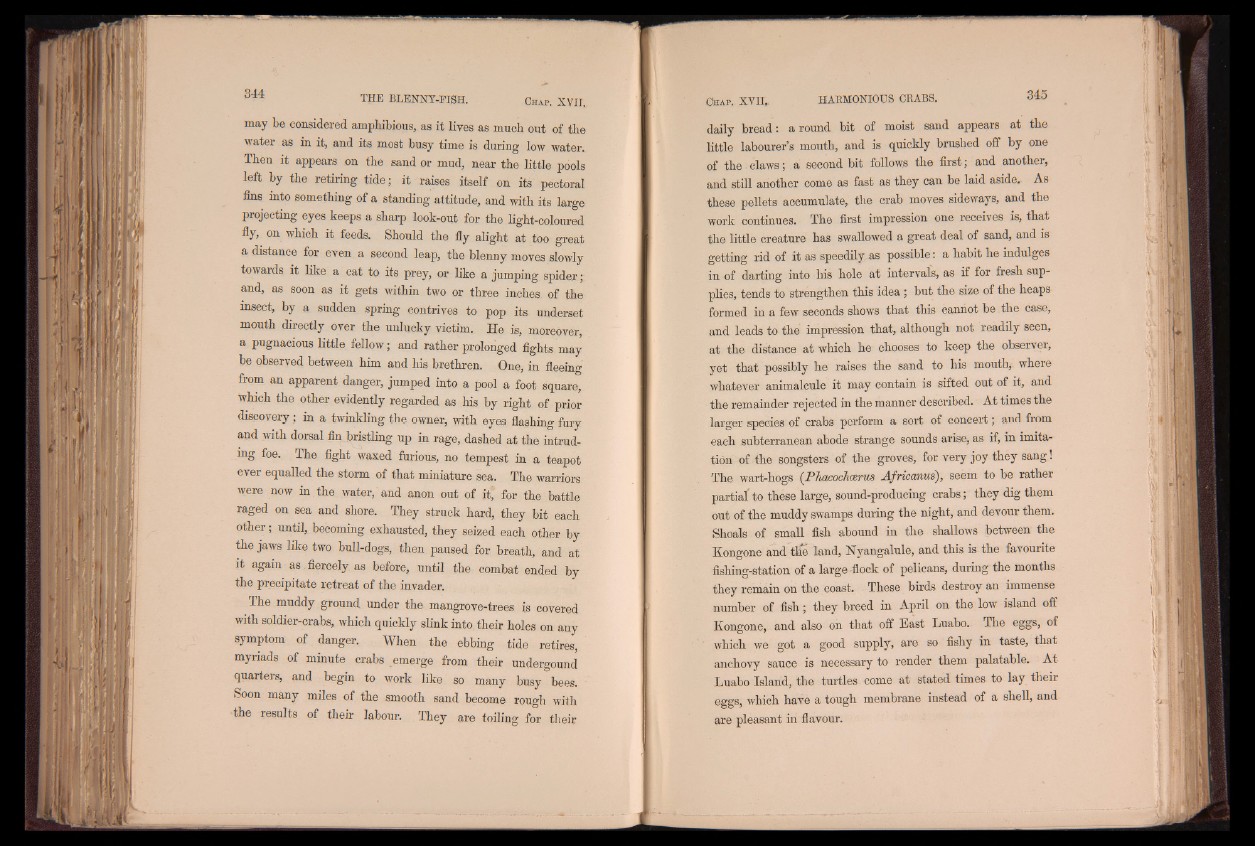
may be considered amphibious, as it lives as much out of the
water as in it, and its most busy time is during low water.
Then it appears on the sand or mud, near the little pools
left by the retiring tide; it raises itself on its pectoral
fins into something of a standing attitude, and with its large
projecting eyes keeps a sharp look-out for the light-coloured
fly, on which it feeds. Should the fly alight at too great
a distance for even a second leap, the blenny moves slowly
towards it like a cat to its prey, or like a jumping spider;
and, as soon as it gets within two or three inches of the
insect, by a sudden spring contrives to pop its underset
mouth directly over the unlucky victim. He is, moreover,
a pugnacious little fellow; and rather prolonged fights may
be observed between him and his brethren. One, in fleeing
from an apparent danger, jumped into a pool a foot square”
which the other evidently regarded as his by right of prior
discovery; in a twinkling the owner, with eyes flashing fury
and with dorsal fin bristling up in rage, dashed at the intruding
foe. The fight waxed furious, no tempest in a teapot
ever equalled the storm of that miniature sea. The warriors
were now in the water, and anon out of it* for the battle
raged on sea and shore. They struck hard, they bit each
other; until, becoming exhausted, they seized each other by
the jaws like two bull-dogs, then paused for breath, and at
it again as , fiercely as before, until the combat ended by
the precipitate retreat of the invader.
The muddy ground under the mangrove-trees is covered
with soldier-crabs, which quickly slink into their holes on any
symptom of danger. When the ebbing tide retires,
myriads of minute crabs emerge from their undergound
quarters, and begin to work like so many busy bees.
Soon many miles of the smooth sand become rough with
the results of their labour. They are toiling for their
daily bread: a round bit of moist sand appears at the
little labourer’s mouth, and is quickly brushed off by one
of the claws; a second bit follows the first; and another,
and still another come as fast as they can be laid aside. As
these pellets accumulate, the crab moves sideways, and the
work continues. The first impression one receives is, that
the little creature has swallowed a great deal of sand, and is
getting rid of it as speedily as possible: a habit he indulges
in of darting into his hole at intervals, as if for fresh supplies,
tends to strengthen this idea; but the size of the heaps
formed in a few seconds shows that this cannot be the case,
and leads to the impression that, although not readily seen,
at the distance at which he chooses to keep the observer,
yet that possibly he raises the sand to his mouth, where
whatever animalcule it may contain is sifted out of it, and
the remainder rejected in the manner described. At times the
larger species of crabs perform a sort of concert; and from
each subterranean abode strange sounds arise, as if, in imitation
of the songsters of the groves, for very joy they sang!
The wart-hogs ([Phacochcerus Africanus), seem to be rather
partial' to these large, sound-producing crabs; they dig them
out of the muddy swamps during the night, and devour them.
Shoals of small fish abound in the shallows between the
Kongone and tlie land, Nyangalule, and this is the favourite
fishing-station of a large flock of pelicans, during the months
they remain on the coast. These birds destroy an immense
number of fish; they breed in April on the low island off
Kongone, and also on that off East Luabo. The eggs, of
which we got a good supply, are so fishy in taste, that
anchovy sauce is necessary to render them palatable. At
Luabo Island, the turtles come at stated times to lay their
eggs, which have a tough membrane instead of a shell, and
are pleasant in flavour.